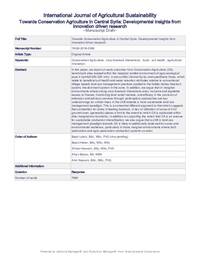Towards Conservation Agriculture in Central Syria: Developmental insights from innovation driven research

Authors:
In this paper, we report on early outcomes from Conservation Agriculture (CA) benchmark sites located within the marginal rainfed environment of agro-ecological zone 4 (rainfall 200-250 mm) in pre-conflict Central Syria; and specifically those, which relate to beneficial soil health and water retention attributes relative to conventional (tillage based) land use management practices applied to the fodder barley-livestock system, the dominant system in the zone. In addition, we argue that in marginal environments where strong crop-livestock interactions exist, inclusive and equitable access to finance, functioning land rental markets, and efficacy in the provision of extension and advisory services through participatory approaches are key underpinnings for critical mass in the shift towards a more sustainable land use management paradigm. This is a somewhat different argument to that which suggests that competition for straw in feeding livestock, in lieu of utilization of some of it for ground cover, (generally) places a limit to the extent to which CA is applicable within drier marginal environments. In addition to supporting the notion that CA is an avenue for sustainable production intensification, we also argue that a shift in land use management paradigm towards CA is likely to additionally bode well for social and environmental resilience, particularly in those marginal environments where both pastoralism and agro-pastoralism production systems co-exist.
